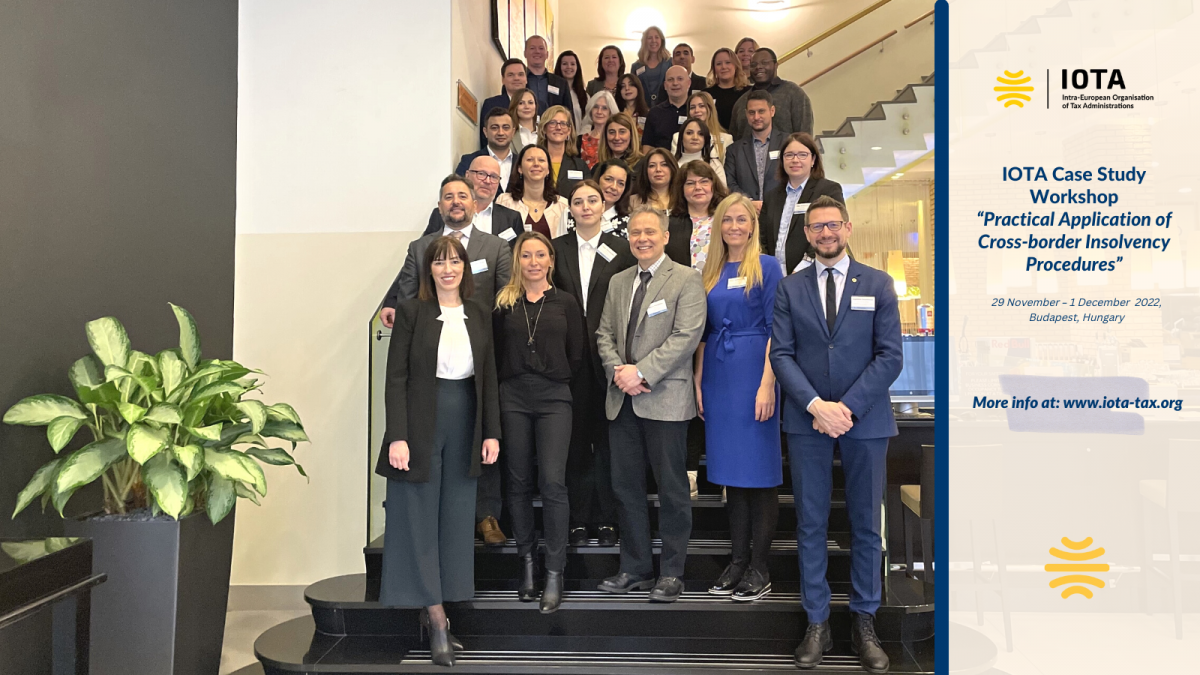On 29 November - 1 December 2022, IOTA pulled off another successful activity in Budapest, Hungary. As one of the last events of the year, the Case Study Workshop on Practical Application of Cross-border Insolvency Procedures welcomed more than 30 tax officials from 17 IOTA member countries gathering personally at the venue.
The Workshop provided opportunities for debt collection officers to get acquainted with methods of acting successfully as a creditor in cross-border insolvency procedures and become familiar with practical experiences and best practices that are available in IOTA member countries. The event focused on examining and discussing cases of cross-border insolvency procedures, the application of which led to the successful collection of claims. Through the analysis of practical cross-border insolvency cases, participants sought to identify obstacles and proposals for possible enhancement of mutual administrative assistance amongst different IOTA member countries in this area.
During the 3-day event, IOTA member tax administrations such as Belgium, Greece, Lithuania, Norway, Portugal, and Sweden presented cross-border insolvency cases and their approaches of resolving complexities faced while initiating insolvency procedures against debtors in another jurisdiction.
The workshop was very practical and built around presenting of a series of selected case studies on cross-border insolvency procedures. Each presentation was combined with group discussion sessions, which provided participants with the opportunity to work together on highlighted issues of the case, share their views and discuss approaches, benefits, opportunities, as well as possible difficulties to each individual case. After the breakout sessions, the groups brought their ideas and suggestions into the plenary, where the attendees opened a debate on various suggested approaches.
On the first day of the event, workshop participants were updated about the IOTA project “Knowledge database of international (cross-border) insolvency proceedings”, led by the Swedish Tax Agency, aiming to create a knowledge database (practical tool) to facilitate decision making process in tax administration concerning debt collection. The database, which is under compilation and elaboration, intends to summarise information on different insolvency procedures, deadlines, document templates and institutions having competence. The project was presented by Anders Öbrink, Manager Compliance Programme Tax Debts at the Swedish Tax Agency.
After the brief introduction of delegates, the Belgian team set the floor for the case study presentations, their case study was co-presented by Felicienne Nyiboka-Bokwetenge and Marcela Postaru from the Federal Public Service Finances of Belgium (FPS Finance). This day brought another in-depth case study into the plenary, which revealed a Greek case presented by Eleni Beka and Evangelia Sotiropoulou from the Independent Authority for Public Revenue of the Hellenic Republic (IAPR). These presentations focused on:
- the facts and evidence that can be related to defining the real Centre of Main Interest (COMI) as a pre-condition for opening main insolvency proceedings in another jurisdiction;
- measures and actions needed to avoid the delay or lack of information for the timely lodging of cross-border insolvency claims;
- handling of late claims (procedure, form, cost, supervisory body);
- challenges arising with the use of native languages in the EU;
- non-responsiveness of the insolvency administrator in another jurisdiction;
- costs related to cross-border insolvency proceedings.
The second day of the workshop put Portuguese, Lithuanian and Norwegian experiences into the spotlight and focused on examining and discussing cases of cross-border insolvency procedures. We welcomed on the stage Carlos Matos Borges from the Portuguese Tax and Customs Authority, Olga Andrievski from the State Tax Inspectorate under the Ministry of Finance of the Republic of Lithuania along with Lars Oscar Strand and Trond Viggo Mjellelid from the Norwegian Tax Administration to speak about their practical experiences and best practices in the cross-border proceedings, such as:
- challenges and opportunities of a legal representation of tax administration as a creditor in another jurisdiction, including assistance mechanisms in place;
- conditions for writing-off tax debt from an insolvent company in another country;
- possible improvements in the existing mutual assistance system permitting tax administrations to notify each other on regular basis when a bankruptcy proceedings are open in another state.
The closing day of the workshop offered new findings on the Practical Application of Cross-border Insolvency Procedures and brought another group of incisive conversations into the plenary. With our speakers Lena Gustafsson and Elisabeth Lustig from the Swedish Tax Agency on the stage, workshop participants explored:
- practical solutions of handling challenging insolvency cases where information requested by the administrator or foreign court/other foreign authority is not available;
- the pros and cons of making online services for the lodging of insolvency claims mandatory;
- sharing sources of information on international bankruptcies available at the EU level and in participating IOTA member countries.
The attendees of the workshop could raise questions and seek clarification on the presented cases at each plenary, besides they were also actively involved in group discussion sessions during the three-day event. Each breakout session had a thematic stream on case studies, specific experiences, examples of methods and solutions illustrating how IOTA member tax administrations can act successfully as a creditor in insolvency procedures carried out in another jurisdiction.
The chairpersons of the breakout sessions played a major role in conducting the workshop. The group discussion sessions were co-chaired by Anna Drapikowska & Iwona Banach (Poland), Jukka Mononen (Finland), Amanda Miller & Martin Tossell (United Kingdom), Sara Öbrand (Sweden), Aleksandar Aleksiev (Bulgaria), Evangelia Sotiropoulou (Greece), along with Carlos Matos Borges (Portugal).
We also would like to extend our appreciation to our panellists dr. Katalin Kanizsai (Hungary), Marju Vahing-Mõttus & Terje Kriiseman (Estonia), Wilfried Meidom (France).
Thank you all once again for your excellent collaboration and dedication towards the IOTA Case Study Workshop on Practical Application of Cross-border Insolvency Procedures.
All material and case studies from the plenary sessions are available to registered IOTA members through the dedicated webpage of the Case Study Workshop on the IOTA website.

